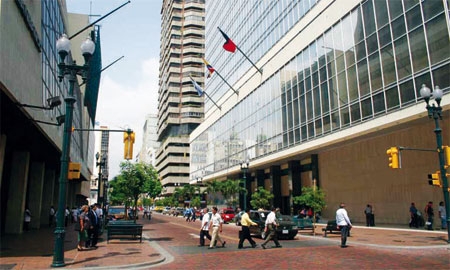It isn’t hard to see why Guayaquil is known as the commercial capital of Ecuador when 42 per cent of the country´s top 100 companies have chosen the vibrant city as the base for their operations. Guayaquil has, since colonial times, been an important centre of commerce, and is today the backbone of Ecuador´s economy – thanks to a thriving seaport, state-of-the-art airport and excellent infrastructure.
For international companies, the appeal of Guayaquil lies not only in its being a large market in itself, but also as a point of access to business throughout Ecuador and the rest of Latin America.
Ecuador's economy first developed around the harvesting of agricultural products such as bananas, coffee and cocoa. As different regions of the country were settled, other resources were exploited and production diversified to include lumber and oil from the Amazon, shrimp and fish from the coast, and fruits, grains and other food commodities. Oil, shrimp, and bananas are the nation's top three exports, while the manufacturing sector accounts for less than 7 percent of all exports. Presently 70 per cent of exports and imports go through Guayaquil port.
According to the 2009 ranking of the Economic Commission for Latin America and the Caribbean (ECLAC), of the 50 largest ports in Latin America, Guayaquil is ranked ninth. In 2009, the concessionaire of the seaport, Contecon, invested $100 million in terminal equipment and the purchase of cranes for the operation of ships with greater capacity.
Trade, industry, tourism and real estate are the engines that drive Guayaquil. The city generates 58 per cent of Ecuador’s customs revenues, over 25% of national GDP. In the province of Guayas, of which Guayaquil is the capital, the share of trade in provincial GDP is 33.5 per cent, according to Central Bank of Ecuador (figures as of 2007). Real estate and business activities reached 31 per cent of provincial GDP, with manufacturing industry occupying 35 per cent.
Eduardo Peña, President of the Guayaquil Chamber of Commerce, says that despite the global crisis, his is still a city that can attract new businesses. "It's a city that gets up everyday and tries to move forward,” said Mr Peña.
“Guayaquil offers what is most important in business: an environment, a culture and an entrepreneurial spirit, plus a local authority very open to development and investment. When you do business here you get a yes or no very quickly - it’s straightforward. Guayacos don’t spin. Decisions are made quickly, and that’s good for business.”
These sentiments are echoed by Francisco Alarcón, President of Tony Corporation, a holding company with investments in the United States.
“If you come to Guayaquil and want to know what people think of you and your project, it will take two days, no more. You don’t have to read between the lines. People are very upfront, very clear. They are not going to waste your time, and that’s something the entrepreneur, the investor highly values.”
Nebot’s administration also aims for strong collaboration between the state and industry especially through public and private partnerships (PPPs). In emerging markets such as Ecuador, rapid economic growth can outstrip infrastructure supply. PPPs allow the public sector access to new sources of finance and the benefits of private sector skills and management that can reduce costs and generate greater value.
So far, PPPs have played a major role in Guayaquil’s development, running its port, water supplies and the Metrovia transit system, among other examples. As Henry Kronfle, President of Guayaquil Chamber of Industry and President of Latin America Industrial Association, remarks: “The rule is very simple: either we have public-private partnerships or we fail.”
Mayor Jaime Nebot adds: “Guayaquil is an autonomic and enterprising city that has its own personality, its own characteristics and its own way of seeing things. There is legal security, the rules of the game are clear, and there is a tendency towards a social market economy.

0 COMMENTS